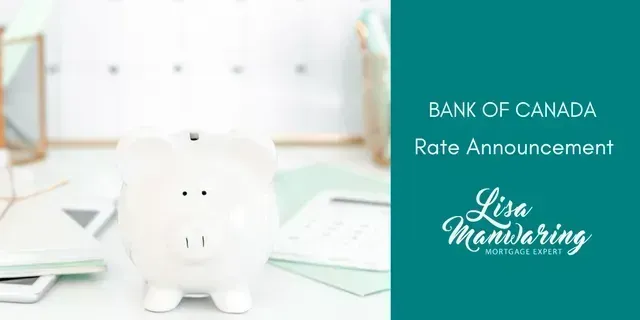Open for Business During COVID-19
Lisa Manwaring • April 22, 2020

If you're thinking about buying a new property, refinancing your existing mortgage, or if your mortgage is up for renewal, you might be wondering if getting a mortgage is even possible amid a global pandemic? Be assured that it is possible, mortgages are being written, and we're open for business (virtually).
Although it may not be business as usual. Mortgage brokers are still brokering, lenders are lending, real estate agents are selling houses, appraisers are appraising (virtually), inspectors are inspecting (some in hazmat suits), while lawyers continue to do what it is that lawyers do. Albeit in a climate of social distancing, with the increased use of technology.
Here are 3 things to consider while you plan for mortgage financing during the COVID-19 pandemic.
Everything is taking more time | Prepare yourself
As almost everyone involved in getting you a mortgage has had to alter the way they regularly do business, entire workforces are shifting from in-person to online. Despite the uptake in technology, things are taking a little longer than usual. Compounded by the fact that lenders are dealing with high submission volumes from clients wanting to defer mortgage payments, processing new mortgage applications can take longer than in previous months.
Your best plan of action is to prepare yourself ahead of time. Everyone is under a lot of pressure, so do everything you can to make sure your proverbial ducks are in a row and that you allow enough time to get everything done. Get as much of your personal documentation together upfront and be as organized as possible, it will go a long way in making for a smooth transaction.
Technology is keeping things running.
While many of the typical steps in the home buying process have been disrupted, with the use of technology, it is possible to buy a home while isolating in COVID-19.
Mortgage, real estate, and lawyer's documents should all be signed online. Although new technology can be scary, e-signatures allow transactions to take place, while doing your part to keep a social distance.
Admittedly, not the same as walking through a property, virtual tours allow you to get a sense of feel for a property more so than simple pictures. A lot of listings should have a virtual tour, while many real estate professionals are hosting virtual open houses, where they can take you on a virtual journey through the property using their phone.
Appraisers aren't required to complete a physical inspection any longer to determine a property's value; instead, everything happens online. An appraiser will use information from MLS data, municipal permits, property assessment information, client or owner information, and any other available source to estimate the physical characteristics of the house interior and the remainder of the property to come up with a valuation.
If you're looking to refinance or renew an existing property, the same is true, with the use of e-signatures and virtual appraisals, you can get a new mortgage, assuming you qualify.
You should expect more scrutiny on your mortgage application!
With over half of Canadians claiming to have lost work due to the COVID-19 coronavirus, it's not surprising that lenders are making a move towards extra scrutiny when assessing your overall application and employment documents. Lenders want to ensure your job stability now but also if things get worse down the line, you have good job prospects in the future.
As far as income goes, in a COVID-19 world, past job performance and income isn't a reliable indicator of future performance and income, everything has changed, and lenders are doing their due diligence. Lenders are becoming more conservative and risk-averse.
Lenders are starting to ask for income documents upfront. There is no use entertaining your mortgage application if they aren't confident about your prospects of employment.
Also, for self-employed borrowers, in addition to the standard required documentation of your past business income, you might be required to provide additional documentation going forward. Including, but not limited to: a description of your business activities, number of employees (including how many are actively working or laid off), current business status (operating or shut down), along with bank statements to prove stable income.
So although it might take a little longer than usual to get a mortgage, and you can most likely expect more scrutiny on your application, with the increased use of technology, mortgage financing is still possible.
If you'd like to discuss your personal financial situation, and how to go about getting a mortgage in these unprecedented economic times, we might not be able to get together in person for a coffee, but I'm open for business virtually and would love to help; please contact me anytime!
RECENT POSTS

Bank of Canada maintains policy rate at 2¼%. FOR IMMEDIATE RELEASE Media Relations Ottawa, Ontario January 28, 2026 The Bank of Canada today held its target for the overnight rate at 2.25%, with the Bank Rate at 2.5% and the deposit rate at 2.20%. The outlook for the global and Canadian economies is little changed relative to the projection in the October Monetary Policy Report (MPR). However, the outlook is vulnerable to unpredictable US trade policies and geopolitical risks. Economic growth in the United States continues to outpace expectations and is projected to remain solid, driven by AI-related investment and consumer spending. Tariffs are pushing up US inflation, although their effect is expected to fade gradually later this year. In the euro area, growth has been supported by activity in service sectors and will get additional support from fiscal policy. China’s GDP growth is expected to slow gradually, as weakening domestic demand offsets strength in exports. Overall, the Bank expects global growth to average about 3% over the projection horizon. Global financial conditions have remained accommodative overall. Recent weakness in the US dollar has pushed the Canadian dollar above 72 cents, roughly where it had been since the October MPR. Oil prices have been fluctuating in response to geopolitical events and, going forward, are assumed to be slightly below the levels in the October report. US trade restrictions and uncertainty continue to disrupt growth in Canada. After a strong third quarter, GDP growth in the fourth quarter likely stalled. Exports continue to be buffeted by US tariffs, while domestic demand appears to be picking up. Employment has risen in recent months. Still, the unemployment rate remains elevated at 6.8% and relatively few businesses say they plan to hire more workers. Economic growth is projected to be modest in the near term as population growth slows and Canada adjusts to US protectionism. In the projection, consumer spending holds up and business investment strengthens gradually, with fiscal policy providing some support. The Bank projects growth of 1.1% in 2026 and 1.5% in 2027, broadly in line with the October projection. A key source of uncertainty is the upcoming review of the Canada-US-Mexico Agreement. CPI inflation picked up in December to 2.4%, boosted by base-year effects linked to last winter’s GST/HST holiday. Excluding the effect of changes in taxes, inflation has been slowing since September. The Bank’s preferred measures of core inflation have eased from 3% in October to around 2½% in December. Inflation was 2.1% in 2025 and the Bank expects inflation to stay close to the 2% target over the projection period, with trade-related cost pressures offset by excess supply. Monetary policy is focused on keeping inflation close to the 2% target while helping the economy through this period of structural adjustment. Governing Council judges the current policy rate remains appropriate, conditional on the economy evolving broadly in line with the outlook we published today. However, uncertainty is heightened and we are monitoring risks closely. If the outlook changes, we are prepared to respond. The Bank is committed to ensuring that Canadians continue to have confidence in price stability through this period of global upheaval. Information note The next scheduled date for announcing the overnight rate target is March 18, 2026. The Bank’s next MPR will be released on April 29, 2026. Read the January 28th, 2026 Monetary Report

So, you’re thinking about buying a home. You’ve got Pinterest boards full of kitchen inspo, you’re casually scrolling listings at midnight, and your friends are talking about interest rates like they’re the weather. But before you dive headfirst into house hunting— wait . Let’s talk about what “ready” really means when it comes to one of the biggest purchases of your life. Because being ready to own a home is about way more than just having a down payment (although that’s part of it). Here are the real signs you're ready—or not quite yet—to take the plunge into homeownership: 1. You're Financially Stable (and Not Just on Payday) Homeownership isn’t a one-time cost. Sure, there’s the down payment, but don’t forget about: Closing costs Property taxes Maintenance & repairs Insurance Monthly mortgage payments If your budget is stretched thin every month or you don’t have an emergency fund, pressing pause might be smart. Owning a home can be more expensive than renting in the short term—and those unexpected costs will show up. 2. You’ve Got a Steady Income and Job Security Lenders like to see consistency. That doesn’t mean you need to be at the same job forever—but a reliable, documented income (ideally for at least 2 years) goes a long way in qualifying for a mortgage. Thinking of switching jobs or going self-employed? That might affect your eligibility, so timing is everything. 3. You Know Your Credit Score—and You’ve Worked On It Your credit score tells lenders how risky (or trustworthy) you are. A higher score opens more doors (literally), while a lower score may mean higher rates—or a declined application. Pro tip: Pull your credit report before applying. Fix errors, pay down balances, and avoid taking on new debt if you’re planning to buy soon. 4. You’re Ready to Stay Put (At Least for a Bit) Buying a home isn’t just a financial decision—it’s a lifestyle one. If you’re still figuring out your long-term plans, buying might not make sense just yet. Generally, staying in your home for at least 3–5 years helps balance the upfront costs and gives your investment time to grow. If you’re more of a “see where life takes me” person right now, that’s totally fine—renting can offer the flexibility you need. 5. You’re Not Just Buying Because Everyone Else Is This one’s big. You’re not behind. You’re not failing. And buying a home just because it seems like the “adult” thing to do is a fast way to end up with buyer’s remorse. Are you buying because it fits your goals? Because you’re ready to settle, invest in your future, and take care of a space that’s all yours? If the answer is yes—you’re in the right headspace. So… Are You Ready? If you’re nodding along to most of these, amazing! You might be more ready than you think. If you’re realizing there are a few things to get in order, that’s okay too. It’s way better to prepare well than to rush into something you're not ready for. Wherever you’re at, I’d love to help you take the next step—whether that’s getting pre-approved, making a plan, or just asking questions without pressure. Let’s make sure your homebuying journey starts strong. Connect anytime—I’m here when you’re ready.


